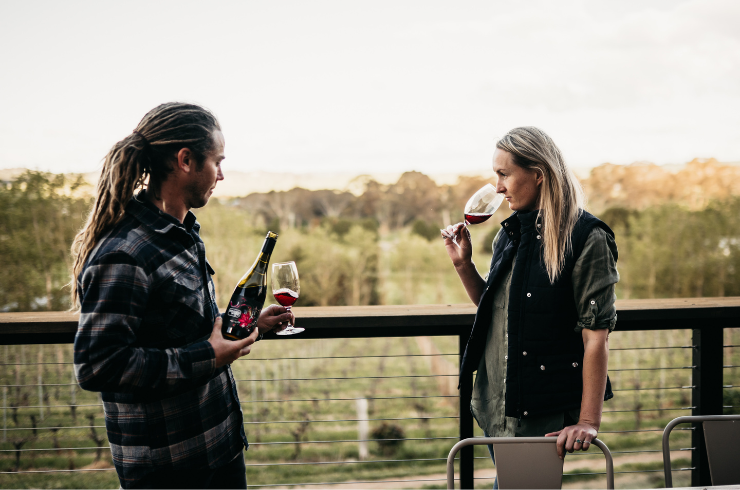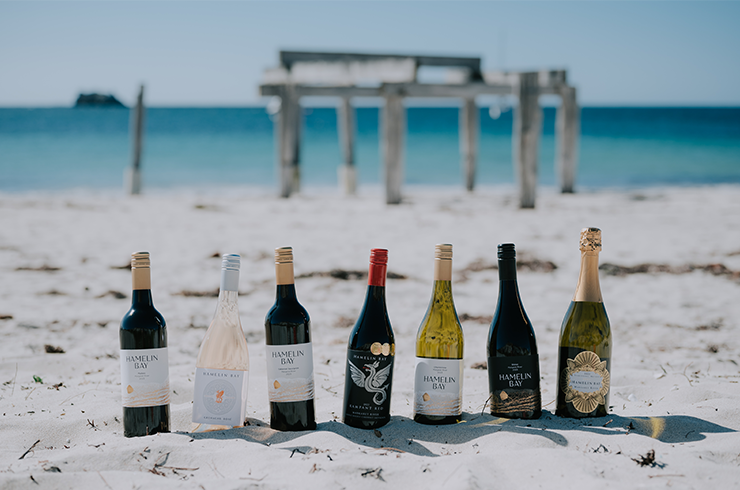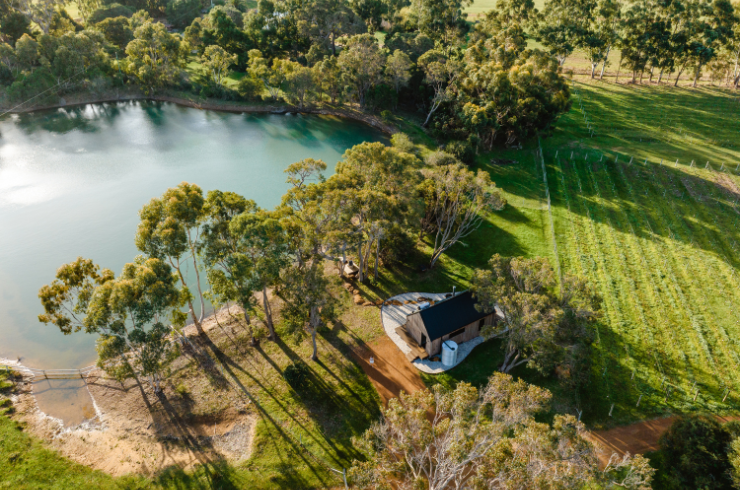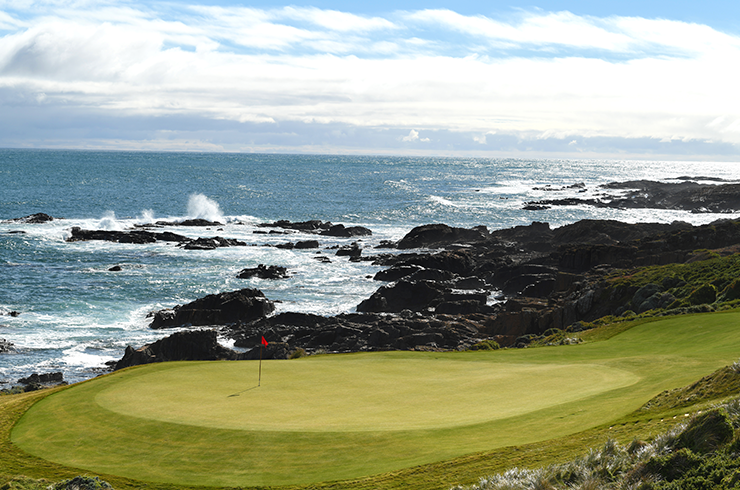What can you tell us about your cellar? We created it when we bought our Coldstream house in 1985. The area, which is also where my office is now, was open to the four winds, so we ran a double skin of bricks with insulation between them against the hillside.
You moved from Sydney to settle in the Yarra Valley. How did you bring your wine collection down? It was quite a task! My wife Suzanne and I overloaded a trailer attached to our Rover 3000 and thought it would easily do the trip, but it took us a lot longer than we expected. I think we had about 30 tonnes of wine. In the end it was packed by removalists and brought down by my law firm Clayton Utz, as I was moving for the company. The terrible thing was that when we pulled out the first bottle, that was fine, but then the next bottle came out of the box, which should have been the same or similar, and it was radically different. Instead of the wines getting packed vertically from my racks, from top to bottom, they went sideways, so there was no rhyme or reason to the 12,000 bottles. It was a major task getting them back in order and I’ve said many times that not in my lifetime will it be moved again!
How many bottles did you have when your collection was at its largest? About 15,000.
Your father was a wine collector. Did his love for wine influence you? It obviously had some impact. He had a walk-in cellar and I was the butler in the sense that he would tell me what wine he wanted that night. I was about eight or nine years old when I held this position. Years later, I gave him a bottle of the 1953 Grange for Christmas, but he didn’t like it one bit.
How did your love for wine develop? I went to St Paul’s College at Sydney Uni for an Arts/Law degree and we had a wine club and cellar there, so we were allowed to have wine in the Great Hall. Then, in 1962, I went overseas for a year with a great mate and we drove from one side of Europe to the other, from Spain to Norway, with a van and a two-man tent. We bought our food at the camping grounds, which was fairly basic, but we’d always have wine in the evening. In that year we didn’t go to a single restaurant or register whether we were in a well-known wine region or not. After that trip was when it all started to come together, and then I met Len Evans in 1968, which is when my eyes opened wide. I thought I knew all I needed to know about Australian wine, but then European wines came along and I was on a voyage of discovery.
What do you love about aged wine? I also love young wine – you don’t have to have one at the exclusion of the other – but I’ve always loved history, and often when I drink old wine it’s in a historical context. Old wine can be awe-inspiring, more than any sort of contemporary wine. The greatest enjoyment you can get from wine is to drink a very beautiful but very old wine. If it is over 50 years old, it’s rare for it to be perfect, given its age. When it is, it’s the nectar of gods.
Where do you stand on cork these days? My teeth are bared each time someone tries to persuade me that cork is a good closure. It is absolutely critical and unanswerable for white wine, but for reds it’s not as dramatic. However, I don’t buy wine under cork unless I’ve got no other option, and I don’t buy any Australian wine under cork.
What can you tell us about your wine-buying habits? Now that we’ve got screwcaps, I’m still buying wine, but then I think why am I doing this? I’ve got 10,000 bottles of wine in the cellar, why am I buying more wine? There’s really no convincing answer except that it’s nice to have my favourite wines when they’re young and when they’re old, and when they’re transiting from young to old they’re always changing, so there’s always a place for them. It’s the biggest cue I have for my ageing. I never used to think about it, but when I’m doing tasting notes, I find myself writing ‘This will be a wonderful wine to drink to 2034’ and then I realise I’m not going to be around to see it.
Have you always found it easy to open great bottles? I’ve always held the view that it’s better that I drink the wine than someone else when I’m no longer capable of it. Over the past 20 or 30 years, I’ve deliberately let down my cellar from the height it was for that reason. I’ve never ever hesitated to share great bottles. I always say it costs me nothing to take a bottle out of the cellar.
What is the temperature in your cellar? In winter, it’s about 14 degrees, which is good, but by mid-summer, it’ll be 22. The daily temperature range is in fact very small though, so it takes a very long time to cool down and warm up due to the number of bottles in there and also the physical layout of it, the concrete above, the double brick and the steel door.
What would you do differently to your cellar if you were starting again now in terms of set-up? I would think seriously about spending more money insulating the area and putting in a condenser chiller so as not to dry out the air, with a view to keeping the cellar to 13 or 14 degrees. That would extend the life of the wines.
What’s one of the oldest wines you’ve tried? I enjoyed a 1642 Tokaji, which came in a little, pale blue glass flagon – I still have it. It could only have ever been laid down in a cellar and had the tide marks that supported that idea. It had dried out, which is what happens with sweet wines, unless they’re incredibly sweet – so it was no longer dramatically sweet, but you could tell it was a very complex white wine. It really was in good condition.
Do you have many sentimental bottles left? I’ve still got a couple of bottles left of a dozen I purchased at Christie’s in the 1970s, which had been bottled in the late 1700s as a flor sherry. Every time I’ve produced it and shared it, it’s been remarkable.
What cellar maintenance do you wish kept up or done better over the years? I wish I’d kept a close watch on the fill levels in each of the bottles and returned to the cellar with a plan so that every six months, I’d check the levels again. If it was okay and there were multiple bottles, I’d check one more to be sure.
How many bottles do you believe we should buy of the same wine intended for the cellar? Six. For many people that will seem an awful lot, but I say it’s not. If you want to track that wine and are interested in its development, you don’t want to get into a position where you’ve drunk your six bottles and the last one is the best, and you’ve gobbled it up too quickly. If you only put one or two in the cellar, they’re trophies – and in that case, drink them when you want! Six is minimal and 12 is more likely, in which case if you’ve tasted them and not really enjoyed them you can put some back into auction, and quite frequently get your money back.
How much has your palate changed over the years? I have very definitely moved away from Bordeaux, so that would be the one really significant shift. But apart from that I’m basically still omnivorous in wine terms.
Have you had any great surprises from anything in your cellar over the years? If anything I think the reverse has been the case. There was a time when you’d taste a red wine and it was full of tannin and dark in colour, and you’d think, ‘boy that’s good, I must put that away’, and look forward to 10 years down the track when you think it will knock the socks off you. But if I didn’t stop to think about the wine and wonder if it was balanced, it’s going to be as bad, if not worse, than the wine you tasted 10 years earlier.
You have a particular affection for red Burgundies. How do you describe what you experience in those great aged examples? You get a whole raft of floral tones, like violets, rose petals, red flowers generally, and you get all the spices you’ve ever heard of and then some. You get senses of undergrowth with morels and mushrooms also coming in. All of these things synthesise themselves into a continuous flow of information and pleasure, but it’s got cadences and there’s no one single message at any single moment of tasting and drinking a great old wine. You can’t get over how much these wines change in the glass.
Has turning 80 made you more reflective on what you’ve achieved in your time in the wine industry? If you include the 12 months leading up my 80th birthday, yes, I have become more reflective. This has often been triggered by a wine I come across or an event such as the Single Bottle Club, or, again, my years at Brokenwood, followed by my years here at Coldstream Hills.
What are you particularly proud of at this point in your career? First up, I suppose, is actually reaching 80 years of age! When I was 20 or 30, it never crossed my mind that I would still be moving around when I turned 80. On a more serious note, I suppose the Maurice O’Shea Award for Outstanding Contribution to the Australian Wine Industry in 1995 and being made a Member of the Order of Australia in 2010 are the most tangible third-party recognitions. Writing more than 70 books, and weekly contributions to newspapers [The National Times, then The Australian], plus numerous contributions to magazines here and abroad, require no particular explanation.
What do you look back on most fondly from your time in the wine business? People ask me how long can I keep going, having commented on numerous occasions along the way that they don’t understand how I have been able to create so much material. The reason I have been able to do this is in no small measure attributable to the fellowship among Australians in the wine industry. We enjoy each other’s company and the intellectual challenges, and we can stand back in awe of what Australia has achieved as we move into the decades to come. I am hoping that my involvement in China will help the protection and growth of our market in China, and the improvement in wine quality that will automatically follow if our sales to China continue to increase, or, for that matter, simply maintain their current level. The political world is an uncertain one, but that has always been the case.
This originally appeared as 'A life in wine' in issue #43 of Halliday magazine. You can hear James Halliday on the podcast or search Halliday Wine Companion in your podcast app.



